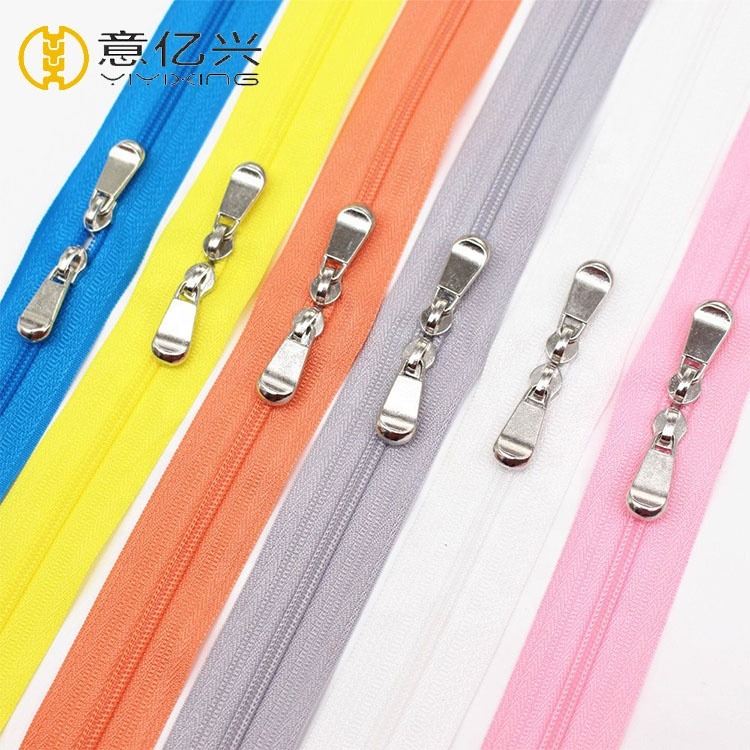Zippers are an essential component in various products, offering a convenient and secure fastening solution. The world of custom zippers provides a wide range of options to suit different needs and applications. In this article, we will explore the four main types of zippers, highlighting their features, functions, and customization possibilities. Understanding these types will help individuals and businesses make informed decisions when selecting custom zippers for their specific requirements.
1. Coil Zippers:
Coil zippers, also known as nylon zippers, are the most common and versatile type of zippers. They consist of a continuous coil made of nylon or polyester that interlocks to create the fastening mechanism. Here are some key features of coil zippers:
1.1. Flexibility: Coil zippers are highly flexible and can adapt to curved or contoured surfaces, making them suitable for various applications, including garments, bags, and accessories.
1.2. Lightweight: The lightweight nature of coil zippers makes them ideal for lightweight fabrics and garments, ensuring optimal comfort and ease of use.
1.3. Customization Options: Coil zippers can be customized with different colors, tape widths, and slider styles to match specific design requirements. This customization option allows for personalized branding or aesthetic enhancements.
2. Metal Zippers:
Metal zippers are known for their durability, strength, and distinctive appearance. They feature metal teeth, usually made of brass or aluminum, that interlock to form the fastening mechanism. Here are some important aspects of metal zippers:
2.1. Durability: Metal zippers are highly durable and can withstand heavy use, making them suitable for rugged applications such as jackets, jeans, or luggage.
2.2. Fashionable Look: Metal zippers add a stylish and edgy touch to products, making them popular in high-end fashion, leather goods, or accessories.
2.3. Customization Options: Metal zippers can be customized with different finishes, including polished, antique, or matte, offering a range of aesthetic possibilities. Customized metal zipper pulls or sliders can also be added to enhance the overall design.

3. Plastic Molded Zippers:
Plastic molded zippers, also known as plastic zippers, feature teeth made of molded plastic. These teeth interlock to create the fastening mechanism. Plastic molded zippers offer unique advantages:
3.1. Versatility: Plastic zippers are available in various styles, including chunky, invisible, or water-resistant options. This versatility makes them suitable for a wide range of applications, from apparel to outdoor gear.
3.2. Lightweight: Plastic zippers are lightweight, making them suitable for lightweight fabrics or products where weight is a consideration.
3.3. Customization Options: Plastic zippers can be manufactured in different colors, tape widths, and textures. They can also be paired with customized plastic zipper pulls or sliders for increased personalization and branding.
4. Invisible Zippers:
Invisible zippers, also known as concealed zippers, are designed to be discreetly hidden within a fabric seam, creating a seamless and uninterrupted appearance. Key features of invisible zippers include:
4.1. Seamless Appearance: Invisible zippers are designed to blend seamlessly with the fabric, making them ideal for formalwear, dresses, or high-end garments.
4.2. Minimalistic Design: The absence of visible teeth or tape on the outside of the fabric gives invisible zippers a clean and minimalistic look.
4.3. Customization Options: Invisible zippers can be customized in terms of length, color, and slider style. Customized sliders can feature personalized branding or design elements, further enhancing the overall aesthetic.
Conclusion:
Understanding the four main types of zippers—coil zippers, metal zippers, plastic molded zippers, and invisible zippers—provides a foundation for selecting the most suitable custom zippers for specific needs. Whether it is the flexibility and versatility of coil zippers, the durability and fashionable appearance of metal zippers, the versatility and lightweight nature of plastic molded zippers, or the seamless and minimalistic design of invisible zippers, each type has its own unique characteristics and applications. Customization options further enhance the possibilities, allowing for personalized branding, color choices, slider styles, and even customized zipper pulls. By considering these factors, individuals and businesses can make informed decisions when selecting custom zippers that perfectly align with their design requirements, functionality needs, and desired aesthetics. So, explore the options, embrace customization, and elevate your products with custom zippers that combine functionality, style, and individuality.


